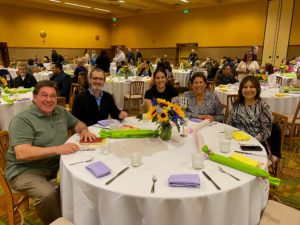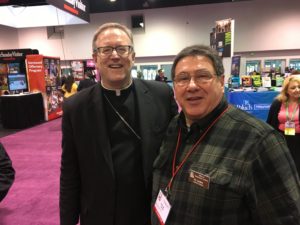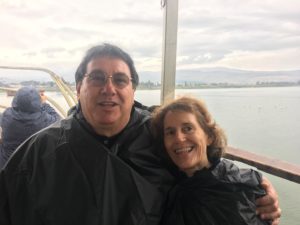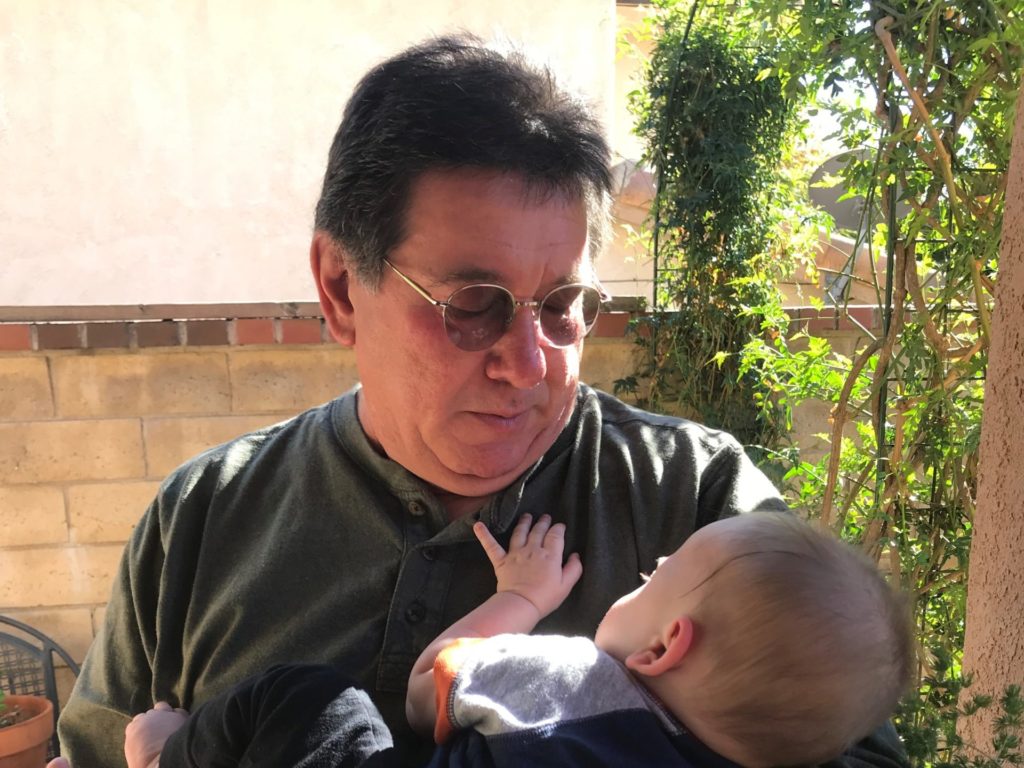Monica Ladisa never knew the full scope of it all.
She was very much aware that her husband of 48 years, Michael Ladisa, worked tirelessly for the Archdiocese of Los Angeles’ Office of Restorative Justice’s prison ministry. The hundreds of hours driving thousands of miles for more than a decade, often spending the night away from their home to connect with a prison community few were willing to become immersed with.
She knew he bought books and things for the inmates, but wasn’t always sure of the how, the where, the why.
She heard him say how he benefited from trips made to Valyermo to the monastery near the Mojave Desert, where he would have deep discussions about the ups and downs in his faith journey.
But it wasn’t until Michael died of an unexpected massive heart attack last May — just a few weeks shy of his 70th birthday — that she began to understand the true impact he had on others.
It started with the thank you messages that came to her on his behalf on 3x5 notecards stuffed into a post-office box, or written in pencil on lined sheets of paper. More of them were posted online.
Trying to convey all the love, guidance, and redemption he gave to them, some were not even written by the inmates themselves, but by thankful spouses, friends, and family members.
Sadly, Michael didn’t get to see them. But Monica has.
“Many of them just thanking me for sharing my husband with them,” Monica said. “They wanted me to know how he put them on the right road. He knew everyone was made in God’s image and treated them that way.”
***
“Thanks to his kind and encouraging words, I looked deeper inside myself and that helped me realize I’m not a complete failure. … Thank you so much for supporting him in his selfless service to all of us who are incarcerated.” — Note written about Ladisa
***
Family and friends filled St. Kateri Church in Santa Clarita in July for Ladisa’s funeral Mass. The homily and eulogies touched on his humble, boundless generosity. The tireless hours driving back and forth from his home in Castaic to visit those in Santa Barbara’s jails in an old green Honda pickup truck with more than 300,000 miles on it.
“It never broke down for the grace of God,” said Monica, trying to laugh through tears, speaking recently about how the grieving process continues.
“He really believed in the motto we have at our office: It’s all about them,” said Gonzalo De Vivero, the Office of Restorative Justice ministry director who hired Ladisa 12 years ago. “You do whatever you can to help the inmates — this is Christ in jail and they need your help to the best of your ability. He became a model of that kind of person in real life.”

Father Francis Benedict, a longtime member of St. Andrew’s Abbey in Valyermo, became Ladisa’s spiritual director and talked about the devotion he had to prison outreach.
“Michael loved the ministry because of the empathy he had on many levels, a desire to bring people closer to God and, for some, bring them back to the Church,” Benedict said. “He really went the extra 20 miles if needed.”
All those miles suddenly caught up with him in late May.
After a long day of gardening at his home, he went upstairs to shower. He was short of breath. He called down to Monica, an experienced nurse, who ran to him and tried chest compressions. The paramedics who arrived could not revive him.
“The last thing he did was smile,” Monica said.
The couple had five children and eight grandchildren. They knew the pain of a sudden loss. Their twin sons, Steve and John, were both gone. Steve was killed in a hit-and-run accident when he was 4 years old. The second, John, was living at their home and died in September 2022 of a sudden illness. He was 44.
“Michael was still deeply affected by that,” Monica said. “Those were heavy on his heart.”
***
“Thank you for everything. I remember you blessed my cell with holy water when I told you there was an evil spirit, paranormal activity, and prayed for me. Thank you. … I fall short at times, but, honest to God, I’m thankful and happy that I have you as a mentor and friend.” — Note written about Ladisa
***
De Vivero first connected with Ladisa from his volunteer trips to the Los Angeles County Sheriff’s North County Correctional Facility in Castaic. That building was a maximum-security complex with some 1,600 inmates, a place De Vivero called “heavy duty members.”
De Vivero said Ladisa would “always ask a million questions, wanting all the details he could get. What I found out was that he did that because he really wanted to do the best job he could, to blend in with the people, and not break any rules. He was able to establish a trust, and I began to appreciate his work even more.”
During dinner one night, De Vivero approached him about a problem: He couldn’t fill a local chaplain role at the Santa Barbara main jail, a minimum-security facility with about 700 inmates. The pay wasn’t much.
“Michael said, ‘Why don’t I help you? I think I can handle that,’ ” said De Vivero, knowing it would entail more than 150 miles and up to three hours of driving round-trip from his home.

Years went by and Ladisa was known for the respect he drew from the inmates based on his dependability and compassion. One example that was not well known even to his circle of friends: He and Monica took in a woman from their church community with nowhere to go. Michael converted his home office into a living space for her. She has been living with the couple for the past 30 years.
He also enriched his spiritual life by visiting the monks at the St. Andrew’s Abbey, about an hour east from his home. He made monthly visits for retreats and confessions with Benedict, who met Ladisa in 1992 and helped him discern going into full-time prison ministry.
Benedict was also fascinated about how Ladisa described his life’s journey — born Catholic, converted to a Protestant at one point, then came back to the Catholic Church later in life.
“He had a humble demeanor, always thinking of a holy life, but underestimating what his own worth was,” Benedict said. “I was always trying to make him see he was doing things God sent him to do. He accepted people where they were.”
***
“I never met Michael Ladisa, yet the life he lived touched mine in many ways. … Michael had a profound impact on my husband. He credits the positive changes that he is making to turn his/our life around, to Michael’s godly leadership and caring.” — Note written about Ladisa
***
The letters and notes weren’t the only things that Monica discovered.
A few weeks after Michael’s death, Monica visited a nearby storage unit she knew he had been renting. She had no idea what was inside.
What greeted her were walls of boxes filled with clothes, books, and Bibles he had collected for inmates.
But why clothes?
De Vivero found out that when some inmates are released from the Santa Barbara jail, it can happen in the middle of a chilly night when they’re wearing just the clothes they came in with — T-shirts, shorts, and maybe sandals. Ladisa took it upon himself to have clothes ready.
Now Monica didn’t know what to do with all this. She called De Vivero.
“He never told me about it,” De Vivero said. “I sent one of our chaplains over with his pickup truck to bring it to our office. He needed two trips to collect it all.”
***
“I knew Michael only by name and reputation, as the well-respected and beloved chaplain who helped turn my husband, and many others lives, around for the good. I am deeply grateful for the life he lived … the effect he had on this earth will ripple out into eternity.” — Note written about Ladisa
***
Monica is even more grateful that she and Michael took a trip to Jerusalem last year instead of waiting to celebrate their 50th anniversary.
She plans to move to Wisconsin to be near her daughter’s family and grandchildren, living within walking distance to the local Catholic Church.
Wrapping things up, Monica said she went recently to close out Michael’s post-office box. The bill was past due. When Monica explained what it was used for, they waived the fees.

That’s where she picked up the latest stack of note cards. De Vivero was also collecting correspondence related to him.
Benedict said he knew that as part of Ladisa’s vigilance in educating inmates about the Catholic faith, he continued with letter-writing exchanges long after some left prison.
“That wasn’t in his job description — promoting fidelity to their faith,” Benedict said. “As some leave jail, they have no support system, so he was really their spiritual director through the letters he kept in correspondence.”
Monica said she wants all to know she has found comfort in the words and notes she continues to receive.
“I want to write back to every one of them,” she said. “Some I have to tell how Michael went to his just reward. I will tell them all that, in my husband’s honor, to please keep on the straight and narrow.”
“I am overwhelmed by how many he touched, and to think I had a wonderful man for so many years, I’m thankful to God.”

